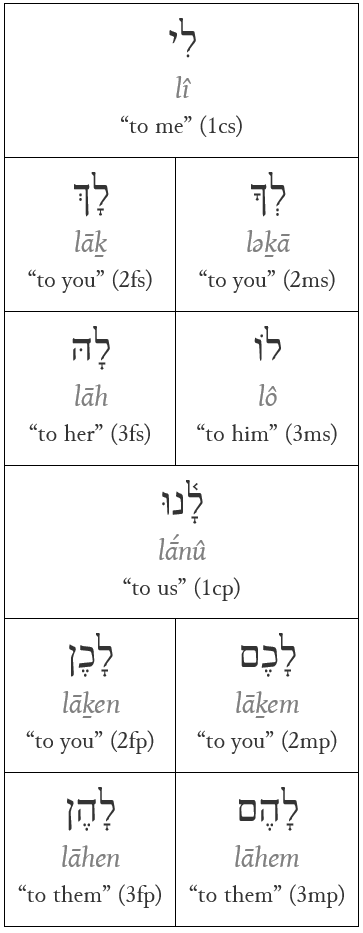Page 3 of 3
Re: Pax vobiscum!
Posted: Sun Dec 18, 2022 6:56 pm
by Sean O'Buadhaigh
Jason Hare wrote: ↑Sat Dec 17, 2022 6:01 pm
It’s the preposition עַל “upon” with the second-person masculine plural (2mp) personal suffix, meaning “upon you (pl.).” So, the first says שָׁלוֹם עֲלֵיכֶם “peace [be] upon you” (šālôm ʿălêḵem), and the response is עֲלֵיכֶם שָׁלוֹם “upon you [be] peace” (ʿălêḵem šālôm).
I'm thinking about that second word again, Jason. (Sorry to bother you with it.) Does the personal suffix constitute some kind of pronoun? Could
עֲלֵיכֶם be termed a prepositional-pronoun? I ask because it strikes me as the only example of this kind of thing I have seen outside the Gaelic languages. I can't speak for the Brittonic languages.
Re: Pax vobiscum!
Posted: Sun Dec 18, 2022 7:07 pm
by Sean O'Buadhaigh
Max S-R wrote: ↑Sun Dec 18, 2022 6:48 pm
That's good thinking, boyo. I have that Weingreen book on loan from the library, and it seems pretty excellent for that scheme. Good luck.
יְהִי אִתְּךָ אוֹר־יְהוָה Sit tecum lux Adonaj.
Thanks for that bit of encouragement!
Right now I'm using Lambdin's introductory sections on the sounds of Hebrew, their transliteration and the several vowel categories. I find Lambdin more thorough on those points than the other grammars I have access too. After I have this done, I'll likely jump horses to Davidson, who has a lot of exercises on this stuff, and then settle down to do the introductory grammar with Weingreen.
But! "The best laid plans of mice and men gang aft agley."
Re: Pax vobiscum!
Posted: Sun Dec 18, 2022 7:49 pm
by Jason Hare
Sean O'Buadhaigh wrote: ↑Sun Dec 18, 2022 6:56 pm
Jason Hare wrote: ↑Sat Dec 17, 2022 6:01 pm
It’s the preposition עַל “upon” with the second-person masculine plural (2mp) personal suffix, meaning “upon you (pl.).” So, the first says שָׁלוֹם עֲלֵיכֶם “peace [be] upon you” (šālôm ʿălêḵem), and the response is עֲלֵיכֶם שָׁלוֹם “upon you [be] peace” (ʿălêḵem šālôm).
I'm thinking about that second word again, Jason. (Sorry to bother you with it.) Does the personal suffix constitute some kind of pronoun? Could
עֲלֵיכֶם be termed a prepositional-pronoun? I ask because it strikes me as the only example of this kind of thing I have seen outside the Gaelic languages. I can't speak for the Brittonic languages.
I guess it’s something like that. In Hebrew, you attach pronoun endings to prepositions. Thus, the preposition לְ־ meaning “to” will take the following endings:
 Do you have a learning grammar that you study out of?
Do you have a learning grammar that you study out of?
Re: Pax vobiscum!
Posted: Sun Dec 18, 2022 7:50 pm
by Jason Hare
Sean O'Buadhaigh wrote: ↑Sun Dec 18, 2022 7:07 pm
Max S-R wrote: ↑Sun Dec 18, 2022 6:48 pm
That's good thinking, boyo. I have that Weingreen book on loan from the library, and it seems pretty excellent for that scheme. Good luck.
יְהִי אִתְּךָ אוֹר־יְהוָה Sit tecum lux Adonaj.
Thanks for that bit of encouragement!
Right now I'm using Lambdin's introductory sections on the sounds of Hebrew, their transliteration and the several vowel categories. I find Lambdin more thorough on those points than the other grammars I have access too. After I have this done, I'll likely jump horses to Davidson, who has a lot of exercises on this stuff, and then settle down to do the introductory grammar with Weingreen.
But! "The best laid plans of mice and men gang aft agley."
I used Seow’s grammar when I was first learning, and his goal in making his grammar was to simplify Lambdin. Jonathan tells me that he added even more. I enjoyed it once it was done.
Re: Pax vobiscum!
Posted: Mon Dec 19, 2022 4:39 am
by Max S-R
Sean O'Buadhaigh wrote:I ask because it strikes me as the only example of this kind of thing I have seen outside the Gaelic languages.
This is one of the striking similarities people like to point out between Gaelic & Hebrew. Irish
dom corresponds more or less exactly to Hebrew
לִי (which is, as Jason has mentioned, the preposition לְ + the 1st person pronominal suffix -ī).
